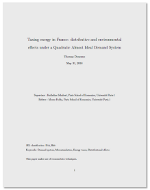Auteur: Thomas Douenne
Sous la direction de: Katheline Schubert
Rapporteur: Mouez Fodha
Contact: thomas.douenne@sciencespo.fr
 Introduction: This paper proposes to evaluate two potential reforms of energy taxes for France as well as the effects of the 2015 and 2016 increases in the rate of the « Contribution-Climat-Energie ». We provide an estimation of the environmental impact of each of these scenarios, as well as their distributive effects. The model allows for households’ specific responses in quantities to price shifts through elasticities, that we estimate using a Quadratic Almost Ideal Demand System. We then discuss the social acceptability of these scenarios and propose several options for revenue-recycling. In particular, we try to identify on which criteria we should design the policy in order to account both for environmental and distributive concerns.
Introduction: This paper proposes to evaluate two potential reforms of energy taxes for France as well as the effects of the 2015 and 2016 increases in the rate of the « Contribution-Climat-Energie ». We provide an estimation of the environmental impact of each of these scenarios, as well as their distributive effects. The model allows for households’ specific responses in quantities to price shifts through elasticities, that we estimate using a Quadratic Almost Ideal Demand System. We then discuss the social acceptability of these scenarios and propose several options for revenue-recycling. In particular, we try to identify on which criteria we should design the policy in order to account both for environmental and distributive concerns.
Our results point toward the high expected environmental efficiency of a reform that would aim at catching up the taxation of diesel toward the rates of gasoline, relative to the small financial burden it raises. The examination of the distributive effects shows that all scenarios of reform are rather regressive prior to revenue-recycling, but using lump-sum transfers to redistribute the new fiscal revenue we can construct progressive policies.
 « La fiscalité énergétique en France : estimation des effets environnementaux et distributifs d’après un modèle de demande » (in English)
« La fiscalité énergétique en France : estimation des effets environnementaux et distributifs d’après un modèle de demande » (in English)
Ce message est également disponible en :  Anglais
Anglais


